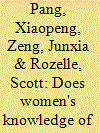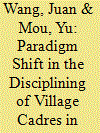| Srl | Item |
| 1 |
ID:
119193


|
|
|
|
|
| Publication |
2013.
|
| Summary/Abstract |
Officials in China claim that voting rates in rural village elections are high. However, the true voting rate is lower, especially for women. We postulate that women are less likely to vote owing to insufficient knowledge about their rights. The objective of this paper is to test whether the knowledge levels of women and village leaders about women's voting rights can affect women's voting behaviour. We report on the results of a randomized controlled trial (RCT) involving 700 women in China's Fujian and Liaoning provinces. Villages were randomly assigned to either a control group or one of three intervention groups. One intervention provided voting training to women only, another provided training to both women and village leaders, and the third provided training to village leaders only. After women received training, their scores on a test of voting knowledge increased, and they more fully exercised their voting rights. When only village leaders were trained, test scores and voting behaviour were not statistically different from the control villages.
|
|
|
|
|
|
|
|
|
|
|
|
|
|
|
|
| 2 |
ID:
181931


|
|
|
|
|
| Summary/Abstract |
Village cadres are important agents for the state yet disciplining them has been difficult. There are few disciplinary tools that can easily hold them to account. Prior to 2018, Party discipline did not apply to non-Party cadres. Legislation was ambiguous in relation to these grassroots agents and had to rely heavily on legal interpretation. The impact of the cadre evaluation system on village cadres, who are not considered to be public servants on the state payroll, was limited. This situation has changed since 2018. The party-state has consolidated and institutionalized ways in which grassroots cadres are checked and disciplined. Instead of relying on policy regulation, which had been the dominant disciplinary method since 1949, village cadres are now fully subject to Party rules and state laws. These changes have been accomplished through the application of three measures. First, village Party secretaries are to serve concurrently as village heads, and members of village and Party committees are to overlap, thereby making them subject to Party discipline. Second, village cadres are now considered to be “public agents” and are on an equal legal footing with other state agents. Finally, a campaign waged by the criminal justice apparatus cleaned up village administration and prepared it for upcoming village elections in a new era.
|
|
|
|
|
|
|
|
|
|
|
|
|
|
|
|